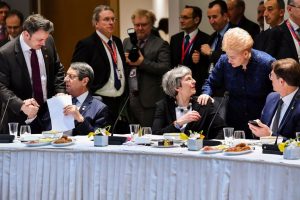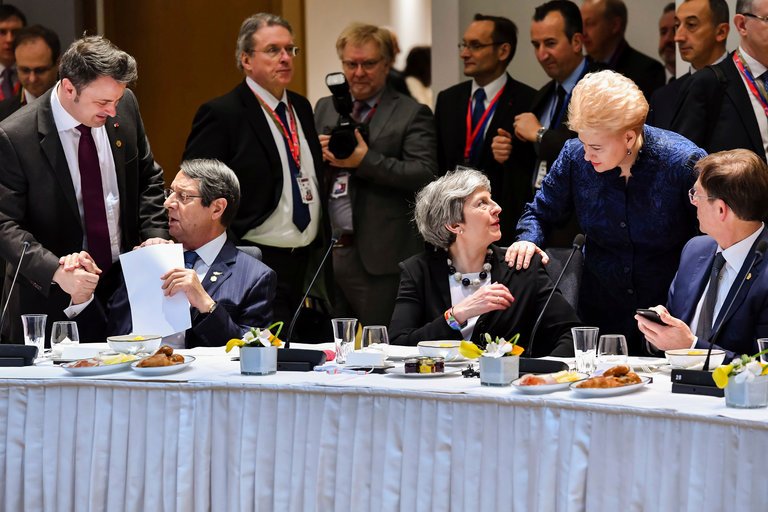
BRUSSELS — Britain’s prime minister, Theresa May, won greater than expected support from the European Union on Friday over her escalating diplomatic battle with Russia, a significant victory for a leader who has often found herself isolated in Brussels as her country prepares to quit the bloc.
After hours of discussion, European leaders issued a relatively tough statement effectively blaming Moscow for the nerve agent attack on a former Russian spy, Sergei V. Skripal, and his daughter, Yulia, on British soil.
The European Union announced the withdrawal of its ambassador to Moscow for consultations, while President Emmanuel Macron said that France and other countries, including Germany, would also take measures, prompting speculation that they would expel some Russian diplomats, as Britain did in response to the attack. Poland, Lithuania, Latvia, Estonia and Denmark are among nations expected to take action as soon as Monday.
Following last night #EUCO, the Head of EU Delegation in Russia is recalled for consultations https://t.co/If076vfEoX
— EU Council Press (@EUCouncilPress) March 23, 2018
“We consider this attack as a serious challenge to our security and European sovereignty, so it calls for a coordinated and determined response from the European Union and its member states,” Mr. Macron said at a joint news conference with the German chancellor, Angela Merkel.
In a declaration of “unqualified solidarity” with Britain, issued early Friday, the European Union said it agrees with the British assessment that “it is highly likely that the Russian Federation is responsible and that there is no plausible alternative explanation.”
The statement followed long talks in which Mrs. May described the reasoning behind Britain’s conclusions that the Kremlin was behind the attack in the quiet cathedral city of Salisbury, including its identification of the chemical used — a strain of the nerve agent Novichok — and its belief that Russia has produced this substance in the last decade.
Welcoming the E.U. response, Mrs. May said it was right that European nations were “standing together” because the hostile challenge Russia poses “respects no borders, and it is a threat to our values.”
In response, Dmitri S. Peskov, the spokesman for the Russian president, Vladimir V. Putin, said that he “did not know what the heads of the E.U. states agreed with” when they offered their support to Britain, as Russia was not given any information.
“We don’t agree with this and repeat that Russia had absolutely nothing to do with the Skripal case,” he said.
Sergei Zheleznyak, a lawmaker from the United Russia party, said that the European Union, under pressure from London and Washington, “was forced to concoct a statement that is vague in content and politicized in essence.”
The declaration was a somewhat surprising success for Mrs. May, who has often found herself at odds with her European counterparts as she negotiates Britain’s exit from the bloc, a process known as Brexit. The text was tougher than one agreed to earlier this week by European Union foreign ministers after talks attended by Britain’s foreign secretary, Boris Johnson.
The issue of relations with Russia divides European Union nations sharply, and there has been pressure from some to lift economic sanctions against Moscow, so Britain has not pressed for additional steps of that kind. However the Irish Prime Minister, Leo Varadkar, said there was talk of the existing measures being renewed for a 12-month period; currently they have to be rolled over every six months. In any event, the Skripal case has reduced prospects of them being relaxed anytime soon.
Before the summit meeting, Mr. Putin spoke by phone with three European Union leaders, the Kremlin announced, a reminder that Moscow has allies within the bloc.
Several countries, including Cyprus and Greece, have close ties to the Kremlin and have been reluctant to take a tougher line. But in traditional European Union style, they agreed to the latest text after extracting concessions on other issues — in this case, wording critical of Turkey’s actions in the Eastern Mediterranean and the Aegean, the site of tensions over drilling for gas.
Though the European Union’s show of support for Britain is so far largely symbolic, it suggests that even after Brexit, London could retain close ties to the bloc on foreign policy, security and defense. It also underscored the strength of Anglo-French cooperation on such issues, with France taking the lead in pushing for a tough, Europe-wide, response. Mr. Macron said that in the poisoning case the French had been asked for “technical cooperation” by the British, and had reached similar conclusions about Russian culpability.
Yet, this time Mrs. May was arguing as the leader of a big member nation from inside a European summit. After next March, Britain’s prime minister will no longer attend such meetings, making the prospect of such a unified European response to a British concern less likely.
On the broader Brexit agenda, things will undoubtedly get difficult again soon. European Union leaders agreed on Friday to the terms of a 21-month transition deal to prevent a “cliff edge” change in trading rules when Britain officially leaves the bloc next March.
The leaders also paved the way for far-reaching talks on a future trade partnership, though there is still no agreement on how to avoid border checkpoints on the frontier between Northern Ireland, which is part of the United Kingdom, and Ireland, which will remain in the European Union.
On trade discussions, Mr. Macron took an uncompromising stance over Britain’s intention to quit the European Union’s single market, which lays down common rules and standards for goods and many services.
“If you are out of the single market you are totally out of it,” he said, adding that, to preserve its integrity, “Europe will stand united.”






























